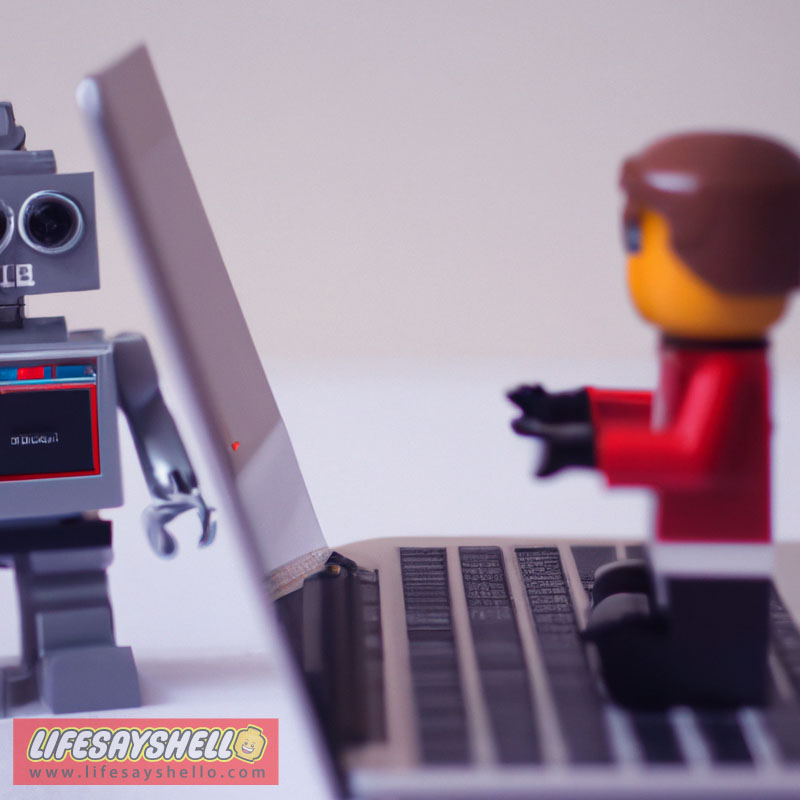The Future is Here: What Jobs Will AI Replace and How To Adapt?

Hey there, future shapers! Ever wondered about the role of artificial intelligence (AI) in our job market? Well, buckle up as we dive into a deep discussion about what jobs AI might replace and how it's going to impact our work life.
Word on the street is, robots are taking over. But not in a scary, sci-fi movie kind of way. We're talking about AI and automation changing the way we work. Let's break it down and explore which jobs might have a date with destiny and eventually saying hi to our new robot colleagues.
The AI Takeover
First up, we must understand what AI is. It's not just about robots that look like us, but it's also about machines and software with the ability to learn, reason, perceive, infer, communicate and make decisions. Now, that's a pretty smart cookie, wouldn't you say?
A lot of fields are experiencing an AI incursion. We can already see robots operating in place of factory workers or chatbots dealing with our customer complaints. Insiders have also suggested that AI might replace jobs in around one-quarter of current professions. Yes, that's right, one-quarter! It seems no job is safe from this technological revolution. But fear not, it's not as terrifying as it might sound.
While the implementation of AI might mean we have to say goodbye to certain roles, reports suggest that by 2025, AI is expected to create 97 million new jobs. Now that's a big number!
The future of work should not be something to fear but something to understand and prepare for. So, let's step into the world of tomorrow and see what's on the horizon.
Jobs most likely to be replaced by AI
1. Factory Workers
Have you ever imagined a factory floor with robots scurrying around instead of humans? That’s not a far-flung sci-fi movie scene anymore - it's the reality of many modern industries.
Technologies are now automating the roles of factory workers, tackling repetitive tasks with precision and speed. Welding, assembly, packing – you name it, and there’s a robot ready to take it on. It’s like Transformers meeting Toy Story on the production line! While it is a challenging time for factory workers, it's also a wake-up call for us to level up our skills game.
2. Personal Assistants
In a world where Siri, Alexa, and Google Assistant are becoming our new best friends, the day when these AI-powered companions replace human personal assistants altogether might not be that far. They can schedule appointments, set reminders, and even tell pretty good jokes (sometimes). As convenient as it is, we shouldn't forget the personal touch and human judgement that AI can't replace...yet.
3. Customer Service Reps
Ok, let's get real. We've all chatted with a support agent online, only to realise halfway through - oops, it's a bot. AI-powered chatbots are shaping customer service delivery by answering queries, resolving issues, and being available 24/7. But surely you miss the comforting empathetic tone of a human when your order is late or the wrong color, right?
4. Data Entry Clerks
Do you know the term 'Big Data'? Well, it's so big that humans alone can’t handle it. AI steps in here, automating the process of entering and processing massive amounts of data, and doing it faster and more accurately than we ever could. Data entry can be tedious, error-prone, and time-consuming. AI is here to do the heavy lifting, but the capability of making sense out of the processed data still remains a human thing.
5. Retail Salespersons
The next time you walk into a store, don't be surprised if you're greeted by an AI-powered robot ready to help you find the perfect pair of sneakers. Automated checkouts and AI-driven recommendations are changing the way we shop and transforming the retail industry. The traditional shop assistant might become a thing of the past, but the desire for authentic, personalised shopper experience means humans still have an irreplaceable role.
Industries Impacted by AI and Automation
AI is shaking up more than just the jobs we mentioned. It's making waves across various sectors and is fundamentally changing how we work, play, and live. Healthcare, transportation, entertainment, education - the applications are limitless. From AI doctors diagnosing diseases to self-driving cars and personalised education based on machine learning, we're just scraping the tip of the AI iceberg!
Future Possibilities - How AI Can Create New Jobs
Don't let the news of jobs being replaced by AI discourage you. The truth is, AI can create countless new opportunities we can't even imagine (Just think: social media manager was not a thing 20 years ago!). By 2025, we expect to have 97 million new AI-created jobs sprung up across various sectors.

As AI takes over repetitive tasks, we usher in a new age of innovative industries. We're talking advanced robotics, personalized healthcare, climate change solutions, and cyber-security precautions. The list is endless.
The tech-savvy will prosper, with high demand for AI engineers and algorithm developers. But don't forget about the human-centric thinkers and creatives that will keep machines in check. As AI builds a more efficient world, we need to be the ones navigating its ethical and practical implications.
Get ready, future generations, the world of work will be rich with exciting careers and challenges that we can only dream of today!
Adapting and Thriving with AI and Automation
Now that we've addressed the elephant in the room, let's talk about how you can prepare for this technologically advanced job market and navigate its thrilling twists and turns.
Embrace lifelong learning: The key to success in the AI era is to be a constant learner. Pick up new skills and sharpen old ones. Embrace online courses, workshops, add certifications to your repertoire – anything to stay ahead.
Focus on transferable skills: Robots can't replace what makes us human. Empathy, creative thinking, problem-solving, and strong communication will always be valuable. Develop these skills and show future employers that you bring something unique to the table.
Balance automation with human skills: Understand how AI can complement your work and make you more productive. Master the art of collaborating with technology, while maintaining a human touch.
Stay positive and be open to new opportunities: Times are changing, but so are we. Embrace change, be proactive in seeking out new opportunities, and think outside the box. The world is your oyster in this AI-driven era!
Conclusion
As we wrap up this deep dive into the world of AI and the job market, remember that the future is not all doom and gloom. Embrace change, stay adaptable, and prepare for an unprecedented era of innovation.
That 'smart cookie' AI might be reshaping our work life, but you, my friend, have the power to be part of this revolution. Stay curious, keep learning, and remember that a world with robots and humans working together is a world full of fantastic possibilities.
Let's make our own mark in the future workplace, confidently stepping into an AI-driven world where we shine together with our newfound robot colleagues! The future starts now, are you ready?




Comments